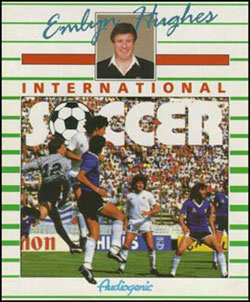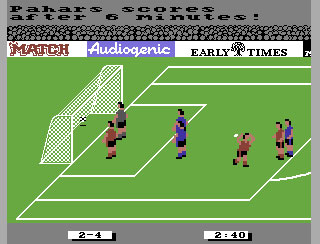 As a teenager, Emlyn Hughes would run up and down flights of stairs in tower blocks until he passed out, in an attempt to build up his stamina. He would do this once or twice a week, and on one occasion ran himself into a coma. It was this kind of behavior that would, in later life, lead to him being called ‘Crazy Horse’. It worked though – he became captain and defensive stalwart at Liverpool throughout the ’70s, winning just about everything the domestic and European game had to offer. He also captained foppishly underachieving England sides under Don Revie and Ron Greenwood. Seemingly unable to stop captaining things even in retirement, Hughes skippered a team on the BBC’s it-will-never-end quiz show A Question of Sport for three years. Not bad for a player who, despite having infectious enthusiasm and iron self discipline, was not actually all that good.
As a teenager, Emlyn Hughes would run up and down flights of stairs in tower blocks until he passed out, in an attempt to build up his stamina. He would do this once or twice a week, and on one occasion ran himself into a coma. It was this kind of behavior that would, in later life, lead to him being called ‘Crazy Horse’. It worked though – he became captain and defensive stalwart at Liverpool throughout the ’70s, winning just about everything the domestic and European game had to offer. He also captained foppishly underachieving England sides under Don Revie and Ron Greenwood. Seemingly unable to stop captaining things even in retirement, Hughes skippered a team on the BBC’s it-will-never-end quiz show A Question of Sport for three years. Not bad for a player who, despite having infectious enthusiasm and iron self discipline, was not actually all that good.
In 1983, Audiovision released Emlyn Hughes’ International Soccer, complete with the Hughes himself beaming away on the front cover, presumably urging the purchaser to play until he collapsed from malnutrition.
The core of the thing was a shameless dusting off of Commodore’s 1983 international soccer themed game that didn’t feature Emlyn Hughes and was simply called, as a result, International Soccer. The Hughes version even had a feature whereby the player could limit gameplay and controls, thus completely mimicking the former release. This was a bit odd, really, as there were enough revolutionary-for-1987 features to give the game its own flagstone on the evolutionary path of football management games. Players could rename their team, choose kit colours and pick from a squad according to ability, which gave a tactical element to the proceedings. There was a two player co-op mode, which was quite a thing to behold, and if both participants had mastered the fiddly controls could provide almost endless showboating possibilities. This kind of thing was nothing less than riotous for an chunk of 8 bit gaming format software. You could even play a full league programme, with FA Cup and a bit of European competition, if you’d qualified. If it was released now, Sky would make you schedule your kick off times to fit in with the car insurance and online bingo adverts – that’s how realistic it all seemed at the time, despite all the Italian players being named after pasta dishes.
 Graphically, the game had a style all of its own. The players ran around with knees pumping but torsos motionless, in the manner of Riverdance, or spinal injuries patients. They slid into tackles fearlessly, and seemed to be able to make the ball stick to their chests at critical moments, which was a handy trick. Amusingly, while punching the air in celebration of a goal, the scorer appeared to be making ‘dickhead’ signs in the direction of the goalkeeper he had just beaten. This was reminiscent of gold medal winners in Daley Thompson’s Decathlon, who seemed to be making ‘wanker’ signs when saluting the thousands of fans who had packed into the stadium to watch their keyboard pounding feats.
Graphically, the game had a style all of its own. The players ran around with knees pumping but torsos motionless, in the manner of Riverdance, or spinal injuries patients. They slid into tackles fearlessly, and seemed to be able to make the ball stick to their chests at critical moments, which was a handy trick. Amusingly, while punching the air in celebration of a goal, the scorer appeared to be making ‘dickhead’ signs in the direction of the goalkeeper he had just beaten. This was reminiscent of gold medal winners in Daley Thompson’s Decathlon, who seemed to be making ‘wanker’ signs when saluting the thousands of fans who had packed into the stadium to watch their keyboard pounding feats.
A quarter of a century after its initial release, there is a thriving community built around EHIS. This online community has spawned several house rules to eliminate some of the software glitches evident in the actual game – such as ceverly running backwards and forwards and making your opponents effectively slide off the screen, or the classic ‘run at the goalkeeper, wait until the point at which he thinks the ball is being passed back to him and bends down to pick it up, then smash it over him into the roof of the net’ trick.
It is somewhat ironic, then, that the man behind the game – Graham Blighe – has no interest in football. This is presumably why it has been left to the Emlyn Hughes International Soccer Community to work out that the highest scoring game ever – which finished 101-102 after extra time – was recorded as a draw, as goals stop being counted after 99 each. This shows Hughes-like commitment, and despite having nothing whatsoever to do with the game itself, the old mentalist himself was no doubt smiling down from the big football pitch in the sky as goal number two hundred and three sailed in.

1 Comment
This is FUD (fear, uncertain and doubt).
are you taking about the best soccer game for the best selling computer all times?
did you ever play it?
This article is so weak.